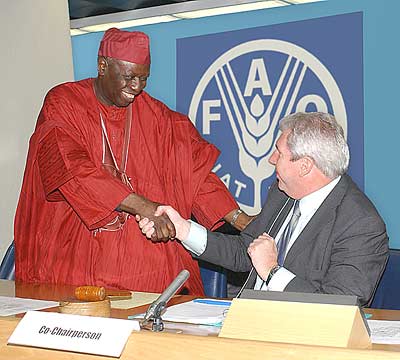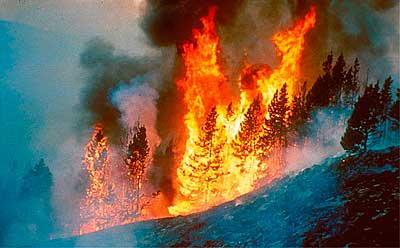


J. Diouf
Jacques Diouf is the Director-General of FAO.
FAO Director-General Jacques Diouf congratulates Ministerial Meeting Co-Chair Elliot Morley, Minister for Environment of the United Kingdom |
 |
FAO/I. BALDERI |
The FAO Director-General invites ministers to address forest fire management and commitment to sustainable forest management.
It is a great pleasure to welcome you to this Ministerial Meeting which follows those of 1995 and 1999. It takes place at a delicate stage of international dialogue on forestry policy. Forests are considered a crucial factor for the achievement of the Millennium Development Goals. They can and must contribute to the reduction of hunger and ensure the sustainability of the environment.
But what kind of world would it be without forests or with forests that were so depleted that they could no longer provide the goods and services that we expect of them? Agricultural productivity would fall. The supply of clean water would become a problem. Millions of people would have to seek other livelihoods. An incalculable number of species would disappear. Alternative products would have to be found to replace the many forest products that we use today. Literature and art would lose a source of reference and natural forests as sanctuaries for poets to seek renewed inspiration would be a thing of the past. This is of course an extreme picture. But with over 9 million hectares lost each year and ever greater forest degradation, the world is undoubtedly heading the wrong way. Now is the time for remedial action.
Reversing current trends calls for the political will to use forests sustainably and to step up efforts to implement national forest programmes and international agreements, especially those on forest management concluded in the past 15 years. FAO is ready to assist the member countries in this regard.
A world without forests would be a world with fewer species, lower agricultural productivity, risk to clean water supplies and loss of livelihoods, as well as a loss of inspiration to humanity |
 |
FAO/FO-0071 |
There are two important items on the agenda of this meeting: international cooperation on forest fire management and maintaining international commitment to sustainable forest management.
Controlled burning is clearly a useful land management tool, but major forest fires can have disastrous consequences. They lead to loss of human life and livelihood, local economies are devastated, and the natural environment is seriously degraded. On average, 200 million to 300 million hectares are burned each year in the world. The extreme climatic conditions of 2002–2003 led to serious fires in Australia, Canada, Italy, Portugal and the United States, with more than 100 deaths. More recently, a huge forest fire started by a careless tourist destroyed more than 14 000 ha of Torres de Paine parkland in Chile’s Patagonia region, a United Nations Educations, Scientific and Cultural Organization (UNESCO) biosphere reserve.
The consequences of forest fires can be reduced by effective management. In the late 1990s forest fires proved devastating in most regions of the world. They spurred many countries to intensify their efforts to prevent, manage and control them. In recent years we have therefore seen greater bilateral and regional cooperation to manage forest fires. FAO is actively engaged in strengthening national capacities and regional cooperation, and in gathering and disseminating useful information on forest fires. We must of course provide greater support to national and regional efforts, but we must also provide help on the global level. You are invited today to take the decisions that are needed to initiate action to develop a global accord for international cooperation in the prevention and management of forest fires.
At the United Nations Conference on Environment and Development of 1992, the member countries decided to work towards sustainable forest management. This commitment was confirmed at both the Millennium Summit of 2000 and the Summit on Sustainable Development of 2002. Considerable progress has been made since then. Many countries have implemented national forest programmes and have expanded their protected areas, notably in Asia. Thus, more than 12 percent of the world’s forests are now situated within protected areas. Partnerships in support of sustainable forest management have multiplied. Close to 150 countries, with territories containing more than 97 percent of the world’s forests, are involved in the nine principal international processes on criteria and indicators. And civil society is now an integral player in the formulation and implementation of forest strategies.
Despite all this progress, much remains to be done to stem deforestation and forest degradation. Appropriate policies are needed and such policies need to be better coordinated. A key element is closer cooperation between the forest sector and other sectors. International cooperation needs to be strengthened, especially to make sufficient funds available and to permit access to appropriate technologies. But most of all we need a genuine political commitment to protect our forests.
FAO, for its part, has carried out an internal review of its activities, with a focus on its forestry programme, so that it can better contribute towards the achievement of the Millennium Development Goals. It is actively involved in the United Nations Forum on Forests (UNFF) and other international bodies that discuss forest policy. It is also lead agency in the Collaborative Partnership on Forests.
The Organization helps its member countries implement their international forest commitments. Your views will therefore be vital for a clearer definition of FAO’s role in this regard. UNFF will be holding its fifth session in May, where the member countries will be looking at the modalities and functions of the future international arrangement on forests. Your deliberations today are an opportunity to determine the future of this international arrangement.
Through its forestry commissions, the Organization works with its member countries to implement the proposals for action of the Intergovernmental Panel on Forests and the Intergovernmental Forum on Forests. Its support also extends to a number of regional initiatives including the Convergence Plan for the forests of Central Africa and the Congo Basin Forest Partnership.
Major forest fires can have disastrous consequences, but they can be reduced by effective management |
 |
WWW.FORESTRYIMAGES.ORG/0806078/D. POWELL, USDA FOREST SERVICE |
Before introducing His Excellency Denis Sassou Nguesso, President of the Republic of the Congo, it is my great pleasure to inform you that we have among us the winner of the prestigious Nobel Peace Prize, Ms Wangari Maathai of Kenya. Madam, it is indeed an honour to welcome you to this Ministerial Meeting on Forests.
I hope that many of you will be able to attend the seventeenth session of the Committee on Forestry, which will begin its work on Tuesday and go on until 19 March. One of the committee’s tasks will be to see to the implementation of the decisions that you take today.
Finally, it is my earnest hope that your Ministerial Meetings can take place every two years to provide high-level policy dialogue on forest-related issues before adoption of the Organization’s Programme of Work and Budget.
I therefore wish you a very successful meeting and thank you for your kind attention.